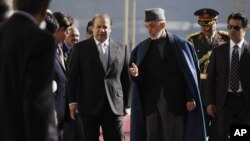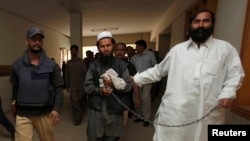ISLAMABAD —
Afghan and Pakistani leaders have agreed to further efforts aimed at opening peace talks between representatives of the Afghan government and the Taliban-led insurgency.
After meeting with President Hamid Karzai in Kabul Saturday, Pakistani Prime Minister Nawaz Sharif emphasized the need for ending what he described as “the destructive cycle of conflict” in Afghanistan.
Sharif undertook his first day-long visit to Kabul since his election to review progress in bilateral relations and to reiterate Islamabad’s commitment to Afghan reconciliation efforts.
He told a joint news conference after meeting with Karzai that Pakistan has "steadfastly" supported the Afghan peace process and will continue to do so.
"I take this opportunity to once again urge all the stakeholders to seize this moment and join hands to support the peace efforts. It is imperative to reverse the destructive cycle of conflict," said Sharif. "This is a time to take decisive steps for moving forward (the) dialogue process and bringing it to a successful conclusion. Pakistan would continue to extend all possible facilitation for the Afghan peace process.”
Top Taliban leaders are believed to be based in Pakistan, and Karzai has been pressing its neighbor to use its influence to bring the militant group to the negotiating table.
While Islamabad denies allegations it is supporting Afghan insurgents, it has confirmed that a number of Taliban officials are jailed in Pakistan, an issue has been at the center of recent tensions in bilateral ties.
But speaking on Saturday, Karzai acknowledged that relations have improved since Sharif took office, adding that he hopes the political and economic ties would improve to a level where both countries can live in peace — a situation that can be achieved, he added, only when both countries are free from terror and extremism.
A delegation of Afghanistan’s High Peace Council, which is tasked with persuading the Taliban to join the national reconciliation process, visited Islamabad more than a week ago.
The delegation reportedly met with former deputy leader of the Taliban, Mullah Abdul Ghani Baradar who lives under strict supervision of the Pakistani authorities. So far, officials in both countries have refused to confirm the meeting.
However, Sharif Saturday promised the Afghan leadership that his government would continue to facilitate meetings between Afghan peace negotiators and Baradar.
“We have discussed this matter at length today and we jointly have agreed on a mechanism and we will see that it is properly implemented," said Sharif. "Anybody who is sent by the president to Pakistan to talk to Mullah Baradar, we will carry out the instructions given to us by the president and we will make sure that such meetings would take place.”
Baradar attempted to engage in peace talks with Afghan officials in a third country and was traveling through Pakistan in 2010 when authorities arrested him.
Afghan leaders say the former Taliban deputy commander still retains enough influence within the insurgency to help start the troubled peace process.
Pakistan has released around 40 Taliban prisoners in recent months at the request of the Council, hoping they will join political reconciliation efforts in Afghanistan.
However, most of these freed men have refused to go back or have not shown any readiness to talk to Karzai's government.
The bulk of the NATO forces are preparing to leave Afghanistan by end of next year, at which point local forces will become responsible for national security.
A sustainable peace process is considered crucial for the post-withdrawal period, despite skepticism about the current preparedness of Afghan security forces.
After meeting with President Hamid Karzai in Kabul Saturday, Pakistani Prime Minister Nawaz Sharif emphasized the need for ending what he described as “the destructive cycle of conflict” in Afghanistan.
Sharif undertook his first day-long visit to Kabul since his election to review progress in bilateral relations and to reiterate Islamabad’s commitment to Afghan reconciliation efforts.
He told a joint news conference after meeting with Karzai that Pakistan has "steadfastly" supported the Afghan peace process and will continue to do so.
"I take this opportunity to once again urge all the stakeholders to seize this moment and join hands to support the peace efforts. It is imperative to reverse the destructive cycle of conflict," said Sharif. "This is a time to take decisive steps for moving forward (the) dialogue process and bringing it to a successful conclusion. Pakistan would continue to extend all possible facilitation for the Afghan peace process.”
Top Taliban leaders are believed to be based in Pakistan, and Karzai has been pressing its neighbor to use its influence to bring the militant group to the negotiating table.
While Islamabad denies allegations it is supporting Afghan insurgents, it has confirmed that a number of Taliban officials are jailed in Pakistan, an issue has been at the center of recent tensions in bilateral ties.
But speaking on Saturday, Karzai acknowledged that relations have improved since Sharif took office, adding that he hopes the political and economic ties would improve to a level where both countries can live in peace — a situation that can be achieved, he added, only when both countries are free from terror and extremism.
A delegation of Afghanistan’s High Peace Council, which is tasked with persuading the Taliban to join the national reconciliation process, visited Islamabad more than a week ago.
The delegation reportedly met with former deputy leader of the Taliban, Mullah Abdul Ghani Baradar who lives under strict supervision of the Pakistani authorities. So far, officials in both countries have refused to confirm the meeting.
However, Sharif Saturday promised the Afghan leadership that his government would continue to facilitate meetings between Afghan peace negotiators and Baradar.
“We have discussed this matter at length today and we jointly have agreed on a mechanism and we will see that it is properly implemented," said Sharif. "Anybody who is sent by the president to Pakistan to talk to Mullah Baradar, we will carry out the instructions given to us by the president and we will make sure that such meetings would take place.”
Baradar attempted to engage in peace talks with Afghan officials in a third country and was traveling through Pakistan in 2010 when authorities arrested him.
Afghan leaders say the former Taliban deputy commander still retains enough influence within the insurgency to help start the troubled peace process.
Pakistan has released around 40 Taliban prisoners in recent months at the request of the Council, hoping they will join political reconciliation efforts in Afghanistan.
However, most of these freed men have refused to go back or have not shown any readiness to talk to Karzai's government.
The bulk of the NATO forces are preparing to leave Afghanistan by end of next year, at which point local forces will become responsible for national security.
A sustainable peace process is considered crucial for the post-withdrawal period, despite skepticism about the current preparedness of Afghan security forces.





